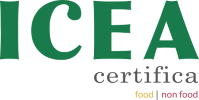It certifies food products and catering gastronomic preparations, cosmetics, other non-food products (e.g. footwear, clothing, etc.). It helps vegan consumers to identify on the market the products obtained without the use of ingredients derived from animals.
What it is certified
ICEA specification for the certification of vegan and vegetarian products has been developed in collaboration with LAV Lega antivivisezione (Anti-vivisection Association), which for some years has been promoting an information campaign in favour of 100% plant consumption. From the very beginning, great emphasis has been given to the combination of “organic” and “vegan”. ICEA certification, in fact, although it is also applicable to conventional products, aims to enhance mainly Organic-Vegan and Organic Vegetarian products, which are identified with dedicated trademarks. In the case of vegetarian products, for example, ingredients based on milk, eggs and honey must be organic or coming from farms that respect animal welfare and feed them without GMOs. Not all consumers know that bread may contain lard, rennet used for cheese production is usually obtained from calf’s abomasum and those products of animal origin such as casein, albumin, and animal jellies are used to produce wine. Even careful reading of the list of ingredients on the label is often not enough to reassure the consumer who prefers vegetarian or vegan diets. The use of ingredients of animal origin sometimes disguised by general indications followed by law. In other cases, their indication on the label is not required because they are contained in limited quantities or because they are discarded following completion of the production cycle. This is the case, for example, of processing aids and processing aids used in the preparation of foodstuff. The specification contains the product and process requirements required to obtain this certification and the related identification trademark. The specification contains the product and process requirements required to obtain this certification and the related identification trademark.
How to certify
The certification process is divided into four main phases.
- Initial assessment of the products and production process, including the assessment of the composition of the products for which certification is requested, as well as the conformity of raw materials through the technical data sheets of all components, including additives and technological processing aids. The applicant company must describe all working procedures and separation and cleaning measures taken to prevent any contact and contamination with animal ingredients.
- On-site inspection to verify the actual conformity of the products with the vegan requirements of the specification; the correct organisation and management of manufacturing processes and internal procedures that could compromise the conformity of the product with the requirements defined in the standard; the respect of the relevant environmental and social criteria.
- Issue of the Certificate of Conformity based on information and data collected as part of the evaluation and verification process. The certificate contains the list of certified products and their classification VEGAN and ORGANIC VEGAN.
- Annual surveillance through regular inspections and analysis to confirm the maintenance of compliance conditions.
Documents and downloadable files
[button color=”green” size=”normal” alignment=”none” rel=”follow” openin=”newwindow” url=”/wp-content/uploads/2018/07/DTR 03 Ed02Rev01 vegan_vegetarian_standard_English version 15-04-14.pdf”]Specification[/button] [button color=”green” size=”normal” alignment=”none” rel=”follow” openin=”newwindow” url=”/wp-content/uploads/2018/07/M.RCVOL 01 Ed00 Rev00 Volontary Certification Application form_ENG.PDF”]Application for certification[/button] [button color=”green” size=”normal” alignment=”none” rel=”follow” openin=”newwindow” url=”/wp-content/uploads/2018/07/RC.VOL Voluntary certification rules Ed01 Rev00 ENG.PDF”]Certification regulation[/button] [button color=”green” size=”normal” alignment=”none” rel=”follow” openin=”newwindow” url=”/wp-content/uploads/2018/07/4_M.RCVOL 02 list of fees for vegan and vegetarian certification Ed02 Re….pdf”]Tariffs[/button] [button color=”green” size=”normal” alignment=”none” rel=”follow” openin=”newwindow” url=”https://www.icea.bio/wp-content/uploads/2019/05/VEGAN Informative questionnaire.pdf”]Questionnaire[/button] [button color=”green” size=”normal” alignment=”none” rel=”follow” openin=”newwindow” url=”/wp-content/uploads/2017/01/6.-Piano-gestione-certificazione-volontaria-3B.26-Prodotti-vegetariani-ICEA-Istituto-di-Certificazione-Etica-e-Ambientale.docx”]Management Plan[/button]
[button color=”yellow” size=”normal” alignment=”none” rel=”follow” openin=”newwindow” url=”https://icea.bio/contatta-icea-vegetariani-vegani/” ]Contact us[/button]

